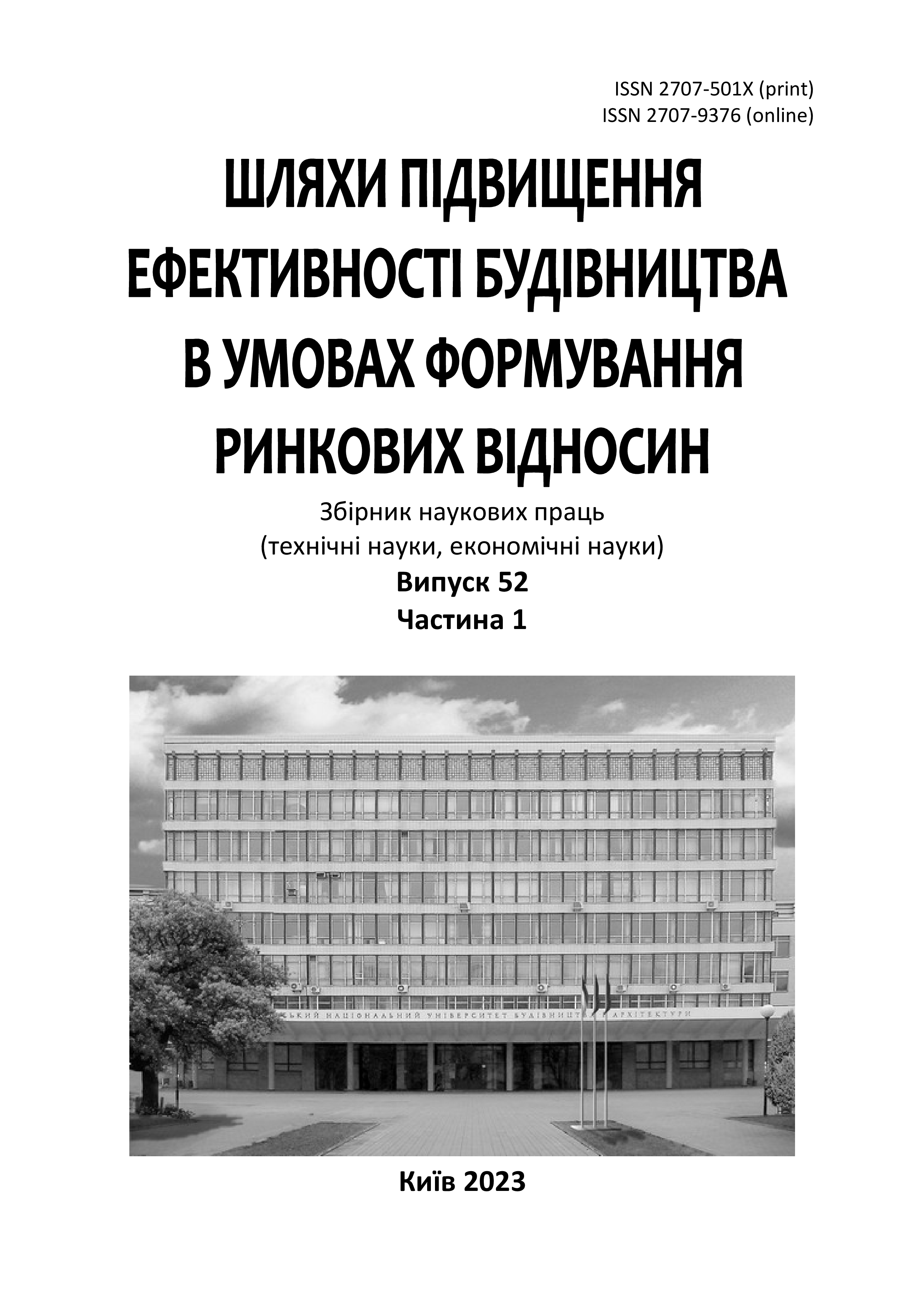Models for forecast-analytical assessment of the economic and managerial transformation of a construction enterprise’s operating system
DOI:
https://doi.org/10.32347/2707-501x.2023.52(1).274-285Keywords:
enterprise, management, production program, development, business, project portfolio, innovative development, construction development companies, digital solutions, productivity, process standardization, economic and managerial transformationAbstract
The article explores innovative applied approaches to the structural-functional regulation of the operational system of construction development companies. It highlights the importance of implementing the latest technologies and management solutions to optimize operational processes in the construction sector. The advantages of digital solutions, automation, Building Information Modeling (BIM), and control systems to improve the efficiency of development companies are analyzed separately. The article also examines the impact of innovations on the regulation and standardization of processes, contributing to increased productivity and quality of construction projects. This foundation provides a clear structure of functions and operations performed by the company, establishes task execution standards and rules, and aids in adapting the business to new market challenges. Such innovations reduce costs, improve productivity, enhance project execution quality, and strengthen the company’s competitiveness in the construction market. The article also addresses forecast-analytical assessment models for evaluating the effectiveness of economic and managerial transformation within the operational systems of construction development enterprises. Special attention is given to tools such as PESTEL analysis, SWOT analysis, Balanced Scorecard, financial ratio analysis, scenario planning, and Economic Value Added (EVA) modeling. Key performance indicators are identified that enable forecasting and evaluating the impact of changes on the enterprise's operating system. The presented models, including elasticity analysis and cost optimization models, comprehensively assess the impact of management and economic factors on operational performance. These models assist construction developers in adapting management strategies to changing market conditions, reducing risks, enhancing operational efficiency, and increasing competitiveness. The article also reveals the advantages of applying forecasting models during transformation and offers practical recommendations for their use in the strategic development of construction enterprises.
References
Smith, J., & Evans, P. (2019). Digitalization in Construction: Structuring Functional Processes for Improved Efficiency. Journal of Construction Innovation, 25(4), 387-402.
Johnson, K., & Davis, R. (2020). Optimizing Building Operations through Innovation: A Case Study on Large-scale Construction Projects. International Journal of Construction Management, 33(1), 58-75.
Lee, H., & Park, S. (2021). Structural and Functional Regulation of Construction Enterprises through Technological Innovations. Journal of Engineering and Management, 45(3), 156-172.
Martinez, P., & Chen, X. (2018). Innovative Approaches to Operational System Regulation in Real Estate Development. Journal of Construction and Real Estate Studies, 12(5), 88-104.
Garcia, L., & Clark, M. (2022). The Role of Digital Transformation in Enhancing Operational Systems of Construction Companies. International Journal of Business and Construction Technology, 19(2), 205-222.
Аксельрод, Р.Б., Шпаков, А.В., & Рижакова, Г.М. (2021). Економіко-управлінські предиктори трансформації операційних систем будівельного девелопменту в умовах цифровізації економіки. Формування ринкових відносин в Україні, (12), 113-121.
Шпаков, А., Приходько, О., Кушнір, І., Ніколаєв, Г., Петруха, Н., & Рижакова, Г. (2021). Структурно-когнітивна та економіко-аналітична основа цифрової трансформації процесів адміністрування будівельними підприємствами. Управління розвитком складних систем, (48), 135-144.
Бєлєнкова, О.Ю. (2018). Переваги впровадження контролінгу в плануванні діяльності будівельних підприємств. Інвестиції: практика та досвід, (10), 47-50.
Рижакова, Г.М., Малихіна, О.М., Рижаков, Д.А., Локтіонова, Я.Ф., Лугіна, Т.С., & Коваль, Т.С. (2018). Ризик-менеджмент в системі управління інтеграційними процесами як складова модернізації економіки України. Управління розвитком складних систем, (36), 113-119.
Хоменко, О., Петренко, Г., Рижакова, Г., Петруха, Н., Чуприна, Ю., Малихіна, О., & Кушнір, О. (2022). Сучасні інструменти та програмні продукти адміністрування будівельними організаціями в умовах трансформації операційних систем менеджменту. Управління розвитком складних систем, (52), 113-125.
Ревунов, О., Рижакова, Г., Малихіна, О., Предун, К., Приходько, Д., & Орленко, І. (2021). Аналітичні інструменти діагностики систем менеджменту якості підприємств-стейкхолдерів будівельних проєктів. Управління розвитком складних систем, (45), 161-169.
Бєлєнкова, О.Ю., & Цифра, Т.Ю. (2019). Формування стратегії забудовників в умовах економічної динаміки. Шляхи підвищення ефективності будівництва в умовах формування ринкових відносин, (42), 189-198.
Рижакова, Г.М., Малихіна, О.М., Ручинська, Ю.М., & Петренко, Г.С. (2019). Економіко-управлінські предиктори стратегічного девелопменту в умовах динамічного середовища впровадження проектів будівництва. Управління розвитком складних систем, (39), 154-163.
Приходько, Д., Дикий, О., Малихіна, О., Валінкевич, Н., Іщенко, Т., & Савчук, Т. (2021). Економіко-інституціональні аспекти формування портфеля девелопера: зміна парадигми й інноваційні рішення управління. Управління розвитком складних систем, (47), 119-129.
Хоменко, О., Рижакова, Г., Малихіна, О., Петренко, Г., & Степанюк, Р. (2023). Цільові пріоритети та формалізовані індикатори трансформації операційних систем стейкхолдерів будівництва. Управління розвитком складних систем, (56), 173-180.
Бєлєнкова О.Ю., & Титок В.В. (2020). Формування конкуренції на ринках первинної нерухомості: теоретичні передумови, моделі, чинники. Шляхи підвищення ефективності будівництва в умовах формування ринкових відносин, (44), 147-164.
Рижакова, Г. М., Орленко, І. М., & Малихіна, О. М. (2021). Методологічна регламентація та аналітико-інформаційне забезпечення менеджменту організацій в сучасній системі будівельного девелопменту. Формування ринкових відносин в Україні, (7-8), 59-65.
Згалат-Лозинська, Л.О. (2020). Державне регулювання формування інтелектуально-інноваційного капіталу у будівництві. Проблеми системного підходу в економіці, 51-57.
Downloads
Published
How to Cite
Issue
Section
License

This work is licensed under a Creative Commons Attribution 4.0 International License.
Authors who publish with this journal agree to the following terms:
- Authors retain copyright and grant the journal right of first publication with the work simultaneously licensed under a Creative Commons Attribution License that allows others to share the work with an acknowledgement of the work's authorship and initial publication in this journal.
- Authors are able to enter into separate, additional contractual arrangements for the non-exclusive distribution of the journal's published version of the work (e.g., post it to an institutional repository or publish it in a book), with an acknowledgement of its initial publication in this journal.
- Authors are permitted and encouraged to post their work online (e.g., in institutional repositories or on their website) prior to and during the submission process, as it can lead to productive exchanges, as well as earlier and greater citation of published work (See The Effect of Open Access).

